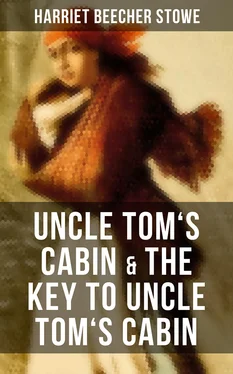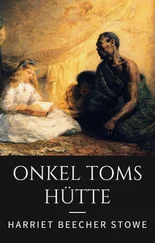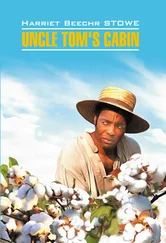"And I, too," said St. Clare, taking up the morning paper.
Eva, the beautiful Eva, had stood listening to her mother, with that expression of deep and mystic earnestness which was peculiar to her. She walked softly round to her mother's chair, and put her arms round her neck.
"Well, Eva, what now?" said Marie.
"Mamma, couldn't I take care of you one night—just one? I know I shouldn't make you nervous, and I shouldn't sleep. I often lie awake nights, thinking—"
"O, nonsense, child—nonsense!" said Marie; "you are such a strange child!"
"But may I, mamma? I think," she said, timidly, "that Mammy isn't well. She told me her head ached all the time, lately."
"O, that's just one of Mammy's fidgets! Mammy is just like all the rest of them—makes such a fuss about every little headache or finger-ache; it'll never do to encourage it—never! I'm principled about this matter," said she, turning to Miss Ophelia; "you'll find the necessity of it. If you encourage servants in giving way to every little disagreeable feeling, and complaining of every little ailment, you'll have your hands full. I never complain myself—nobody knows what I endure. I feel it a duty to bear it quietly, and I do."
Miss Ophelia's round eyes expressed an undisguised amazement at this peroration, which struck St. Clare as so supremely ludicrous, that he burst into a loud laugh.
"St. Clare always laughs when I make the least allusion to my ill health," said Marie, with the voice of a suffering martyr. "I only hope the day won't come when he'll remember it!" and Marie put her handkerchief to her eyes.
Of course, there was rather a foolish silence. Finally, St. Clare got up, looked at his watch, and said he had an engagement down street. Eva tripped away after him, and Miss Ophelia and Marie remained at the table alone.
"Now, that's just like St. Clare!" said the latter, withdrawing her handkerchief with somewhat of a spirited flourish when the criminal to be affected by it was no longer in sight. "He never realizes, never can, never will, what I suffer, and have, for years. If I was one of the complaining sort, or ever made any fuss about my ailments, there would be some reason for it. Men do get tired, naturally, of a complaining wife. But I've kept things to myself, and borne, and borne, till St. Clare has got in the way of thinking I can bear anything."
Miss Ophelia did not exactly know what she was expected to answer to this.
While she was thinking what to say, Marie gradually wiped away her tears, and smoothed her plumage in a general sort of way, as a dove might be supposed to make toilet after a shower, and began a housewifely chat with Miss Ophelia, concerning cupboards, closets, linen-presses, store-rooms, and other matters, of which the latter was, by common understanding, to assume the direction,—giving her so many cautious directions and charges, that a head less systematic and business-like than Miss Ophelia's would have been utterly dizzied and confounded.
"And now," said Marie, "I believe I've told you everything; so that, when my next sick turn comes on, you'll be able to go forward entirely, without consulting me;—only about Eva,—she requires watching."
"She seems to be a good child, very," said Miss Ophelia; "I never saw a better child."
"Eva's peculiar," said her mother, "very. There are things about her so singular; she isn't like me, now, a particle;" and Marie sighed, as if this was a truly melancholy consideration.
Miss Ophelia in her own heart said, "I hope she isn't," but had prudence enough to keep it down.
"Eva always was disposed to be with servants; and I think that well enough with some children. Now, I always played with father's little negroes—it never did me any harm. But Eva somehow always seems to put herself on an equality with every creature that comes near her. It's a strange thing about the child. I never have been able to break her of it. St. Clare, I believe, encourages her in it. The fact is, St. Clare indulges every creature under this roof but his own wife."
Again Miss Ophelia sat in blank silence.
"Now, there's no way with servants," said Marie, "but to put them down, and keep them down. It was always natural to me, from a child. Eva is enough to spoil a whole house-full. What she will do when she comes to keep house herself, I'm sure I don't know. I hold to being kind to servants—I always am; but you must make 'em know their place. Eva never does; there's no getting into the child's head the first beginning of an idea what a servant's place is! You heard her offering to take care of me nights, to let Mammy sleep! That's just a specimen of the way the child would be doing all the time, if she was left to herself."
"Why," said Miss Ophelia, bluntly, "I suppose you think your servants are human creatures, and ought to have some rest when they are tired."
"Certainly, of course. I'm very particular in letting them have everything that comes convenient,—anything that doesn't put one at all out of the way, you know. Mammy can make up her sleep, some time or other; there's no difficulty about that. She's the sleepiest concern that ever I saw; sewing, standing, or sitting, that creature will go to sleep, and sleep anywhere and everywhere. No danger but Mammy gets sleep enough. But this treating servants as if they were exotic flowers, or china vases, is really ridiculous," said Marie, as she plunged languidly into the depths of a voluminous and pillowy lounge, and drew towards her an elegant cut-glass vinaigrette.
"You see," she continued, in a faint and lady-like voice, like the last dying breath of an Arabian jessamine, or something equally ethereal, "you see, Cousin Ophelia, I don't often speak of myself. It isn't my habit; 't isn't agreeable to me. In fact, I haven't strength to do it. But there are points where St. Clare and I differ. St. Clare never understood me, never appreciated me. I think it lies at the root of all my ill health. St. Clare means well, I am bound to believe; but men are constitutionally selfish and inconsiderate to woman. That, at least, is my impression."
Miss Ophelia, who had not a small share of the genuine New England caution, and a very particular horror of being drawn into family difficulties, now began to foresee something of this kind impending; so, composing her face into a grim neutrality, and drawing out of her pocket about a yard and a quarter of stocking, which she kept as a specific against what Dr. Watts asserts to be a personal habit of Satan when people have idle hands, she proceeded to knit most energetically, shutting her lips together in a way that said, as plain as words could, "You needn't try to make me speak. I don't want anything to do with your affairs,"—in fact, she looked about as sympathizing as a stone lion. But Marie didn't care for that. She had got somebody to talk to, and she felt it her duty to talk, and that was enough; and reinforcing herself by smelling again at her vinaigrette, she went on.
"You see, I brought my own property and servants into the connection, when I married St. Clare, and I am legally entitled to manage them my own way. St. Clare had his fortune and his servants, and I'm well enough content he should manage them his way; but St. Clare will be interfering. He has wild, extravagant notions about things, particularly about the treatment of servants. He really does act as if he set his servants before me, and before himself, too; for he lets them make him all sorts of trouble, and never lifts a finger. Now, about some things, St. Clare is really frightful—he frightens me—good-natured as he looks, in general. Now, he has set down his foot that, come what will, there shall not be a blow struck in this house, except what he or I strike; and he does it in a way that I really dare not cross him. Well, you may see what that leads to; for St. Clare wouldn't raise his hand, if every one of them walked over him, and I—you see how cruel it would be to require me to make the exertion. Now, you know these servants are nothing but grown-up children."
Читать дальше












